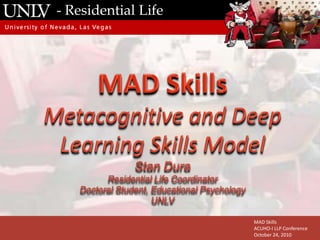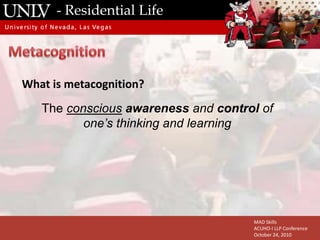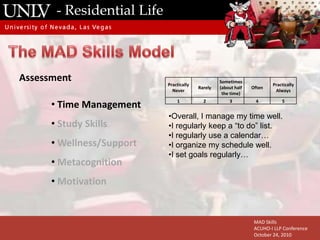Mad Skills
- 1. - Residential Life║▌║▌▀ŻContent BoxMAD SkillsACUHO-I LLP ConferenceOctober 24, 2010
- 2. - Residential LifeMAD SkillsMetacognitive and Deep Learning Skills ModelStan DuraResidential Life CoordinatorDoctoral Student, Educational PsychologyUNLVMAD SkillsACUHO-I LLP ConferenceOctober 24, 2010
- 3. - Residential LifeOverviewEngaging residents in cognitive activity that better supports academic success Metacognition: What is it, and why is it important?
- 4. Metacognitive and Deep-Learning Skills Model
- 5. Applications
- 6. Discussion
- 7. Wrap upMAD SkillsACUHO-I LLP ConferenceOctober 24, 2010
- 8. - Residential LifeStudying vs. LearningStudyingand LearningŌĆ”WhatŌĆÖs the difference?MAD SkillsACUHO-I LLP ConferenceOctober 24, 2010
- 9. - Residential LifeMeaningful LearningMAD SkillsACUHO-I LLP ConferenceOctober 24, 2010
- 10. - Residential LifeMetacognitionWhat is metacognition?The conscious awareness and control of oneŌĆÖs thinking and learningMAD SkillsACUHO-I LLP ConferenceOctober 24, 2010
- 11. - Residential LifeMetacognitionWhy is it important?It is quite possibly the most effective learning skill one can posses.MAD SkillsACUHO-I LLP ConferenceOctober 24, 2010
- 12. - Residential LifeBloomŌĆÖs TaxonomyEvaluationSynthesisAnalysisApplicationComprehensionKnowledgeMAD SkillsACUHO-I LLP ConferenceOctober 24, 2010
- 13. - Residential LifeBloomŌĆÖs TaxonomyCreateTypical in Grad SchoolIntegrateMeaningful LearningAnalyzeTypical in CollegeApplyReproduceRote LearningTypical in High SchoolRememberMAD SkillsACUHO-I LLP ConferenceOctober 24, 2010
- 14. - Residential LifeHave you ever wonderedŌĆ”Why staff donŌĆÖt fill out forms correctly?
- 15. Why staff donŌĆÖt follow procedures correctly after they were trained?
- 16. Why students donŌĆÖt remember the list of rules they went over after check in?MAD SkillsACUHO-I LLP ConferenceOctober 24, 2010
- 17. - Residential LifeMeaningful LearningMAD SkillsACUHO-I LLP ConferenceOctober 24, 2010
- 18. - Residential LifeMetacognitionWhy is it important to us?It transforms academic experiencesŌĆ” MAD SkillsACUHO-I LLP ConferenceOctober 24, 2010
- 19. - Residential LifeMetacognitionIt transforms academic experiencesŌĆ”Travis, junior psychology student Test scores: 47, 52, 82, 86Source: Dr. Saundra Y. McGuireDirector, Center for Academic SuccessAdj. Professor, Department of ChemistryLouisiana State UniversityMAD SkillsACUHO-I LLP ConferenceOctober 24, 2010
- 20. - Residential LifeMetacognitionIt transforms academic experiencesŌĆ”Robert, freshman chemistry student Test scores: 42, 100, 100, 100Source: Dr. Saundra Y. McGuireDirector, Center for Academic SuccessAdj. Professor, Department of ChemistryLouisiana State UniversityMAD SkillsACUHO-I LLP ConferenceOctober 24, 2010
- 21. - Residential LifeMetacognitionIt transforms academic experiencesŌĆ”Michael, senior organic chemistry student Test scores: 30, 28, 80, 91Source: Dr. Saundra Y. McGuireDirector, Center for Academic SuccessAdj. Professor, Department of ChemistryLouisiana State UniversityMAD SkillsACUHO-I LLP ConferenceOctober 24, 2010
- 22. - Residential LifeMetacognitionIt transforms academic experiencesŌĆ”Terrence, junior Bio Engineering student
- 23. Cumulative GPA (after four semesters) 1.67
- 24. After intervention
- 26. 3.80 (spring 2004)Source: Dr. Saundra Y. McGuireDirector, Center for Academic SuccessAdj. Professor, Department of ChemistryLouisiana State UniversityMAD SkillsACUHO-I LLP ConferenceOctober 24, 2010
- 27. - Residential LifeMetacogntionThere are an increasing number of studies demonstrating that metacognition predicts academic success and performance in a range of disciplines.MAD SkillsACUHO-I LLP ConferenceOctober 24, 2010
- 28. - Residential LifeMetacognitionOk, itŌĆÖs important, but residents donŌĆÖt come to study skills programs; how do we do this?Residents donŌĆÖt come to traditional study skills programs because, ultimately, those programs do not impact them.Traditional style programming isnŌĆÖt the best model of development or delivery.MAD SkillsACUHO-I LLP ConferenceOctober 24, 2010
- 29. - Residential LifeMetacognitionOk, itŌĆÖs important, but residents donŌĆÖt come to study skills programs; how do we do this?WhatŌĆÖs needed is a cohesive, time-extended, individual based model, focusing on the aspect of learning that:possesses the most leverage, and
- 30. is the least taught skill in school.MAD SkillsACUHO-I LLP ConferenceOctober 24, 2010
- 31. - Residential LifeMetacognitionOk, itŌĆÖs important, but residents donŌĆÖt come to study skills programs; how do we do this?MetacognitionMAD SkillsACUHO-I LLP ConferenceOctober 24, 2010
- 32. - Residential LifeThe MAD Skills ModelThe Metacognition and Deep Learning Skills Model Offers assessment to identify strengths/weaknesses
- 33. Introduces the concept of metacognition
- 34. Introduces the skills and behaviors involved in effective metacognition
- 35. Encourages a specific study routine based on metacognitive skills
- 36. Engages residents in recursive academic goal setting and evaluation MAD SkillsACUHO-I LLP ConferenceOctober 24, 2010
- 37. - Residential LifeThe MAD Skills ModelAssessmentTime Management
- 38. Study Skills
- 39. Wellness/Support
- 40. Metacognition
- 41. MotivationMAD SkillsACUHO-I LLP ConferenceOctober 24, 2010
- 42. - Residential LifeThe MAD Skills ModelAssessmentTime Management
- 43. Study Skills
- 44. Wellness/Support
- 45. Metacognition
- 46. Motivation
- 47. Overall, I manage my time well.
- 48. I regularly keep a ŌĆ£to doŌĆØ list.
- 49. I regularly use a calendarŌĆ”
- 50. I organize my schedule well.
- 51. I set goals regularlyŌĆ”MAD SkillsACUHO-I LLP ConferenceOctober 24, 2010
- 52. - Residential LifeThe MAD Skills ModelAssessmentTime Management
- 53. Study Skills
- 54. Wellness/Support
- 55. Metacognition
- 56. Motivation
- 57. I read text chapters prior to class.
- 58. I review material after classŌĆ”
- 59. The way I study is effectiveŌĆ”
- 60. I attend class consistently.
- 61. I spend more than 6 hours studyingŌĆ”MAD SkillsACUHO-I LLP ConferenceOctober 24, 2010
- 62. - Residential LifeThe MAD Skills ModelAssessmentTime Management
- 63. Study Skills
- 64. Wellness/Support
- 65. Metacognition
- 66. Motivation
- 67. I get plenty of rest
- 68. I have a good networkŌĆ”for support.
- 69. I take care of my bodyŌĆ”
- 70. I have at least one friend to discussŌĆ”
- 71. I make sure I have ŌĆ£me timeŌĆØŌĆ”MAD SkillsACUHO-I LLP ConferenceOctober 24, 2010
- 72. - Residential LifeThe MAD Skills ModelAssessmentTime Management
- 73. Study Skills
- 74. Wellness/Support
- 75. Metacognition
- 76. Motivation
- 77. I check how well I understandŌĆ”
- 78. I consider different ▓§│┘░∙▓╣│┘▒▓ĄŠ▒▒▓§ŌĆ”
- 79. I take time to plan how I will studyŌĆ”
- 80. I summarize and evaluateŌĆ”
- 81. I determine what info is importantŌĆ”
- 82. I understand strengths of my skillsŌĆ”
- 83. I seek additional info from othersŌĆ”MAD SkillsACUHO-I LLP ConferenceOctober 24, 2010
- 84. - Residential LifeThe MAD Skills ModelAssessmentTime Management
- 85. Study Skills
- 86. Wellness/Support
- 87. Metacognition
- 88. Motivation
- 89. I put a lot of thought into studiesŌĆ”
- 90. I am easily ╗ÕŠ▒▓§│┘░∙▓╣│”│┘▒╗ÕŌĆ”
- 91. When I prioritize my time, studyingŌĆ”
- 92. Whether I like the teacher or notŌĆ”
- 93. I enjoy learning for the most part.MAD SkillsACUHO-I LLP ConferenceOctober 24, 2010
- 94. - Residential LifeThe MAD Skills ModelMetacognitiveSkills and BehaviorsPlanning
- 95. Consciously assessing the learning needs based on content, task, context, etc. and developing appropriate learning strategies
- 96. Monitoring
- 97. Consciously conducting ŌĆ£self-checksŌĆØ to assess understanding, identify questions, and adapt behaviors if ineffective
- 98. Evaluating
- 99. Applying different strategies to assess thoroughness and accuracy of understanding
- 100. Constructing
- 101. Applying strategies to apply and recreate the informationMAD SkillsACUHO-I LLP ConferenceOctober 24, 2010
- 102. - Residential LifeThe MAD Skills ModelMetacognitiveSkills and BehaviorsPlanning related metacognitive questions:What is the purpose and nature of the task/environment?How does this fit into the overall course, major, etc?What do I want/need to learn or what am I expected to learn? What do I already know about this?What resources does the text provide to aid understanding? What kind of information and strategies do I need?Memorization?Interpretation/Representation?Application and Problem solving?Creation?How much time and resources will I need?MAD SkillsACUHO-I LLP ConferenceOctober 24, 2010
- 103. - Residential LifeThe MAD Skills ModelMetacognitiveSkills and BehaviorsMonitoring related metacognitive questions:Do I have a clear understanding?Do the graphics, links, vocabulary words help me understand?Do I need to re-read anything?What is the author trying to say? What will s/he say next?What information is important here? How can I best learn it?Does the task make sense? Am I reaching my goals? Do I need to make changes?What questions would experts ask to see if someone understands?What questions does this raise for me?How is this information relating to what I already know?How would I explain the information up to this point?MAD SkillsACUHO-I LLP ConferenceOctober 24, 2010
- 104. - Residential LifeThe MAD Skills ModelMetacognitiveSkills and BehaviorsEvaluating related metacognitive questions:Have I reached my goal? What worked? What didnŌĆÖt work? Would I do things differently next time?How can I paraphrase and summarize this information?How can I represent this information in pictures, diagrams, etc.?How would I best explain this information to someone else?MAD SkillsACUHO-I LLP ConferenceOctober 24, 2010
- 105. - Residential LifeThe MAD Skills ModelMetacognitiveSkills and BehaviorsConstructing related metacognitive questions:How is this related to what I already know?Does it go against something I know or believe? How can I reconcile that conflict?Does it support something else I know or believe? How?How does this change anything I currently think or know?How could I use this in different contexts/scenarios? Does this highlight or help me see something or topics that I realize I do not know enough about? What can I do to learn about those topics?MAD SkillsACUHO-I LLP ConferenceOctober 24, 2010
- 106. - Residential LifeThe MAD Skills ModelLearning on LockMAD SkillsACUHO-I LLP ConferenceOctober 24, 2010
- 107. - Residential LifeThe MAD Skills ModelLearning on LockPreview
- 108. Preview material before class or study session. Use the Planning and Monitoring metacognition skills. Consider prior-knowledge and questions.
- 109. Attend
- 110. Attend class, take notes, ask questions, consider new questions. Use Monitoring and Evaluating metacognition skills.
- 111. Engage
- 112. Mentally engage with the material, going over it again, analyzing it, comparing it, developing deeper and deeper understanding.
- 113. Recreate
- 114. Reproduce the material in a variety of formats, such as chapter summaries, concept maps, discussion, debate, teaching others, self testingMAD SkillsACUHO-I LLP ConferenceOctober 24, 2010
- 115. - Residential LifeThe MAD Skills ModelLearning on Lock: Engaged Study Sessions Read the material for deep understanding. (15-25 minute periods)
- 116. Reflection on the material (main points, importance, relationship, structure, etc. 10-15 min.)
- 117. Go back through the information and take notes (10-15 minutes). In your own words, note the main points, the important concepts and the visual aids that may help to explain them
- 118. Rinse and Repeat ŌĆō do this several times
- 119. Once immediately after class (within 24 hours)
- 120. Daily - 1-2 times per class, every 48 hours
- 121. Weekly ŌĆō use a longer study session to ŌĆ£wrap upŌĆØ the weekŌĆÖs notes
- 122. Review and summarize all of your notes for the week for each class
- 123. Evaluate your methods and strategies and modify as necessaryMAD SkillsACUHO-I LLP ConferenceOctober 24, 2010
- 124. - Residential LifeThe MAD Skills ModelIndividual AdvisingCheck in ŌĆō assessment is offered (appropriate staff informed of results)RAŌĆÖs meet individually with 60% of their residents monthly:Aug.- Sept. ŌĆō Discuss and set academic goals
- 125. Oct. ŌĆō Introduce Metacognition and ŌĆ£Learning on LockŌĆØ Study Sessions
- 126. Nov. ŌĆō Faculty Program (High Impact for ŌĆ£at-riskŌĆØ when possible). Individual follow up.
- 127. Dec. ŌĆō Evaluate academic goals and discuss successes/challenges
- 128. Jan.- Feb. ŌĆō Set new academic goals
- 129. Mar. ŌĆō Faculty Program (focus on application of skills). Individual follow up.
- 130. Apr.- May ŌĆō Evaluate academic goals and discuss overall academic experienceMAD SkillsACUHO-I LLP ConferenceOctober 24, 2010
- 131. - Residential LifeDiscussionSmall Groups In what ways might this model be adapted for other contexts?
- 132. What challenges and opportunities might it provide in those contexts?MAD SkillsACUHO-I LLP ConferenceOctober 24, 2010
- 133. - Residential LifeDiscussionLarge Group What are some possible examples of how this model might be adapted?
- 134. What questions or concerns would you have if you were adapting it for your own program? MAD SkillsACUHO-I LLP ConferenceOctober 24, 2010
- 135. - Residential Life?Got Questions?MAD SkillsACUHO-I LLP ConferenceOctober 24, 2010
Editor's Notes
- #7: It involves an individual being both aware of her or his thinking and learning and consciously controlling it.
- #8: It involves an individual being both aware of her or his thinking and learning and consciously controlling it.
- #13: It involves an individual being both aware of her or his thinking and learning and consciously controlling it.
- #19: It involves an individual being both aware of her or his thinking and learning and consciously controlling it.
- #20: It involves an individual being both aware of her or his thinking and learning and consciously controlling it.
- #21: It involves an individual being both aware of her or his thinking and learning and consciously controlling it.
- #40: Any questions?





































































































